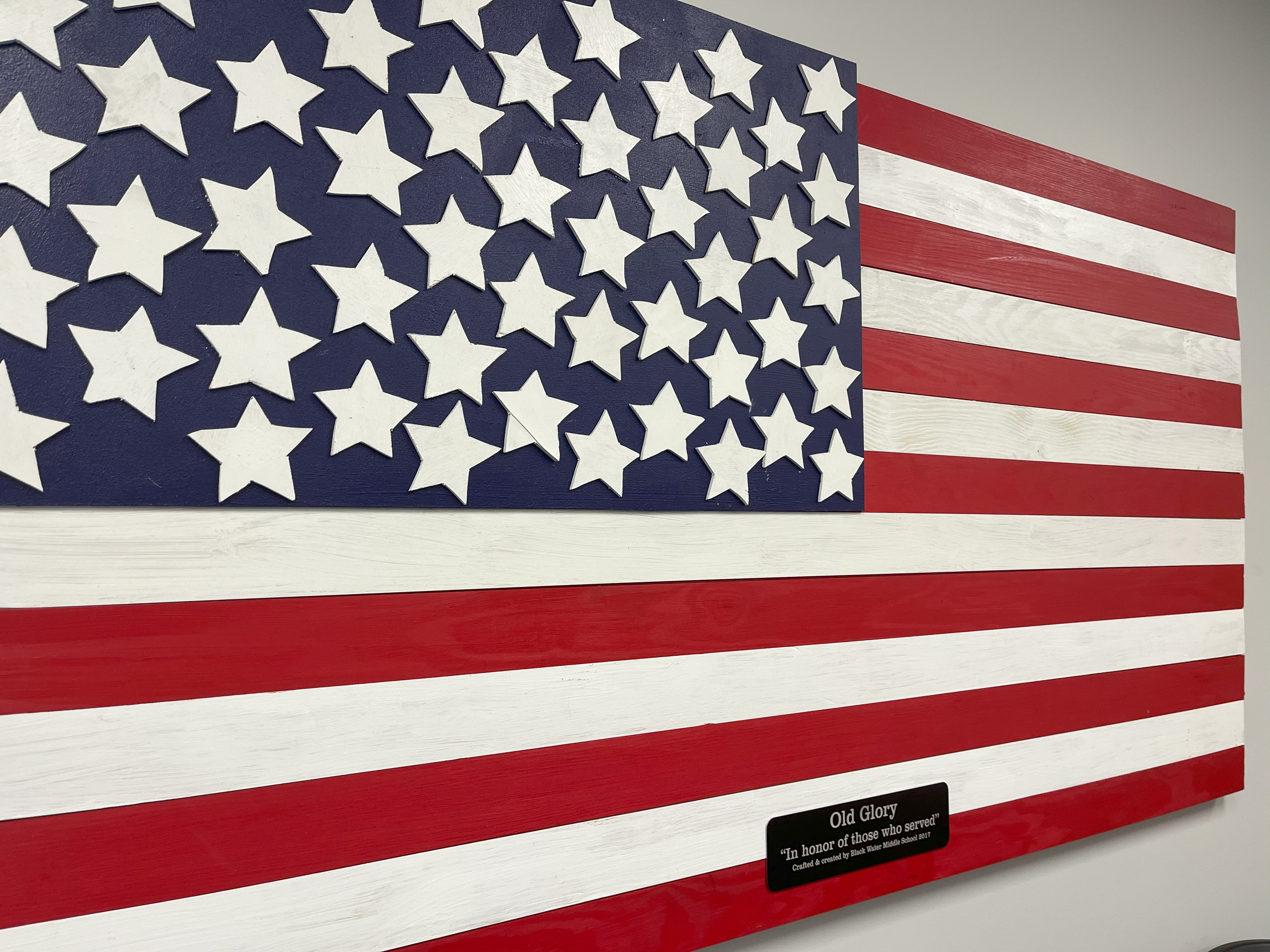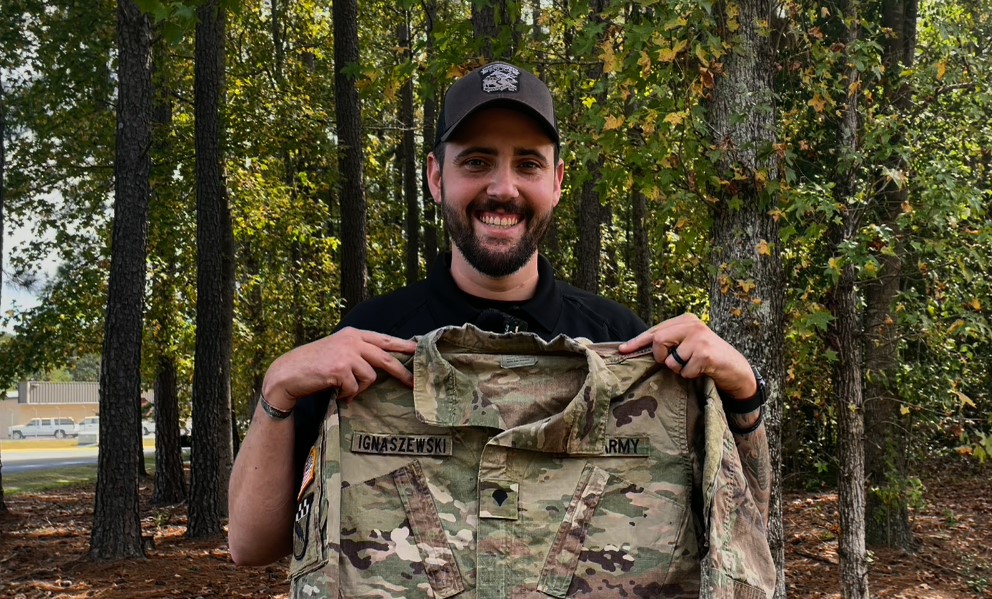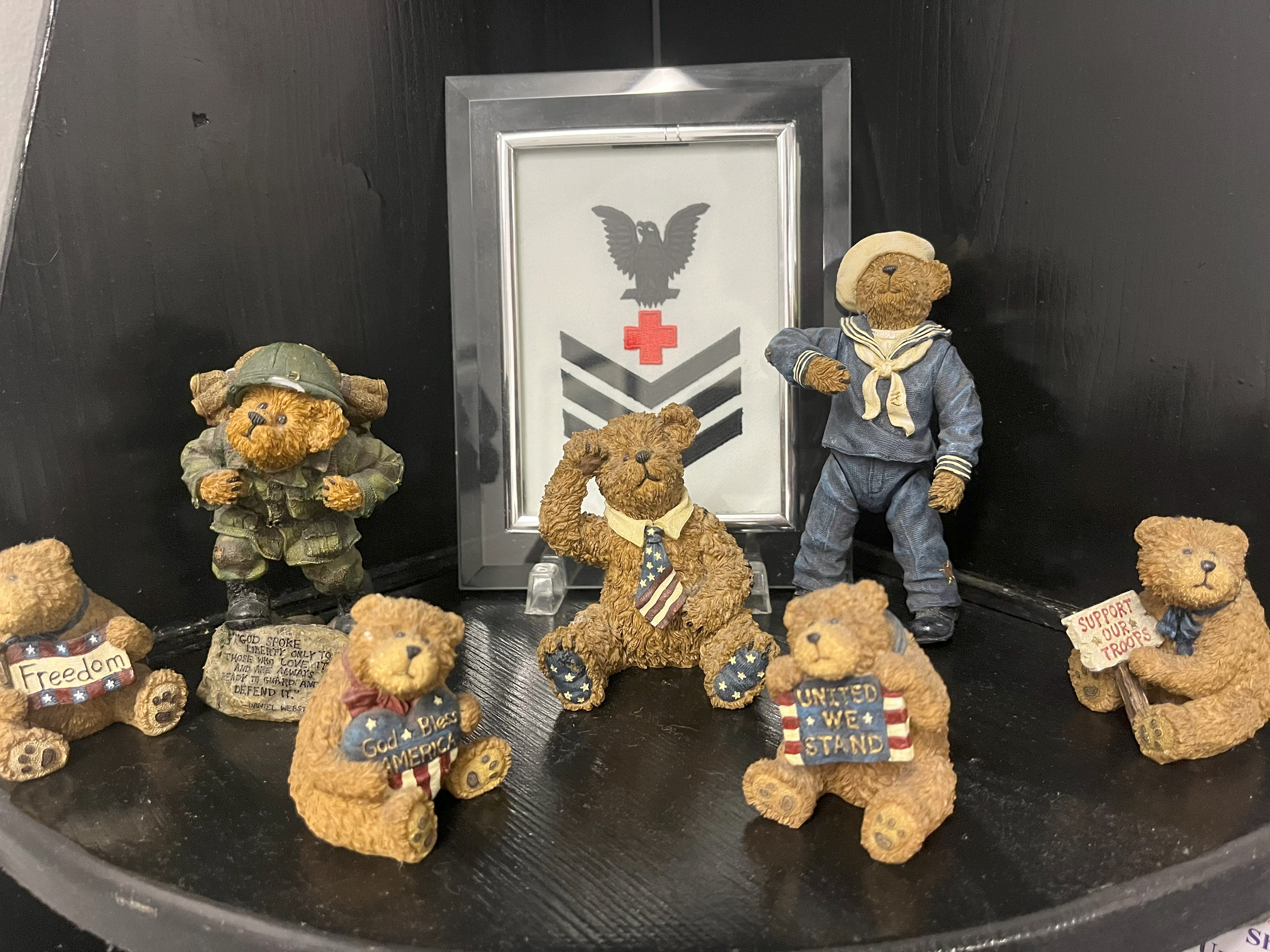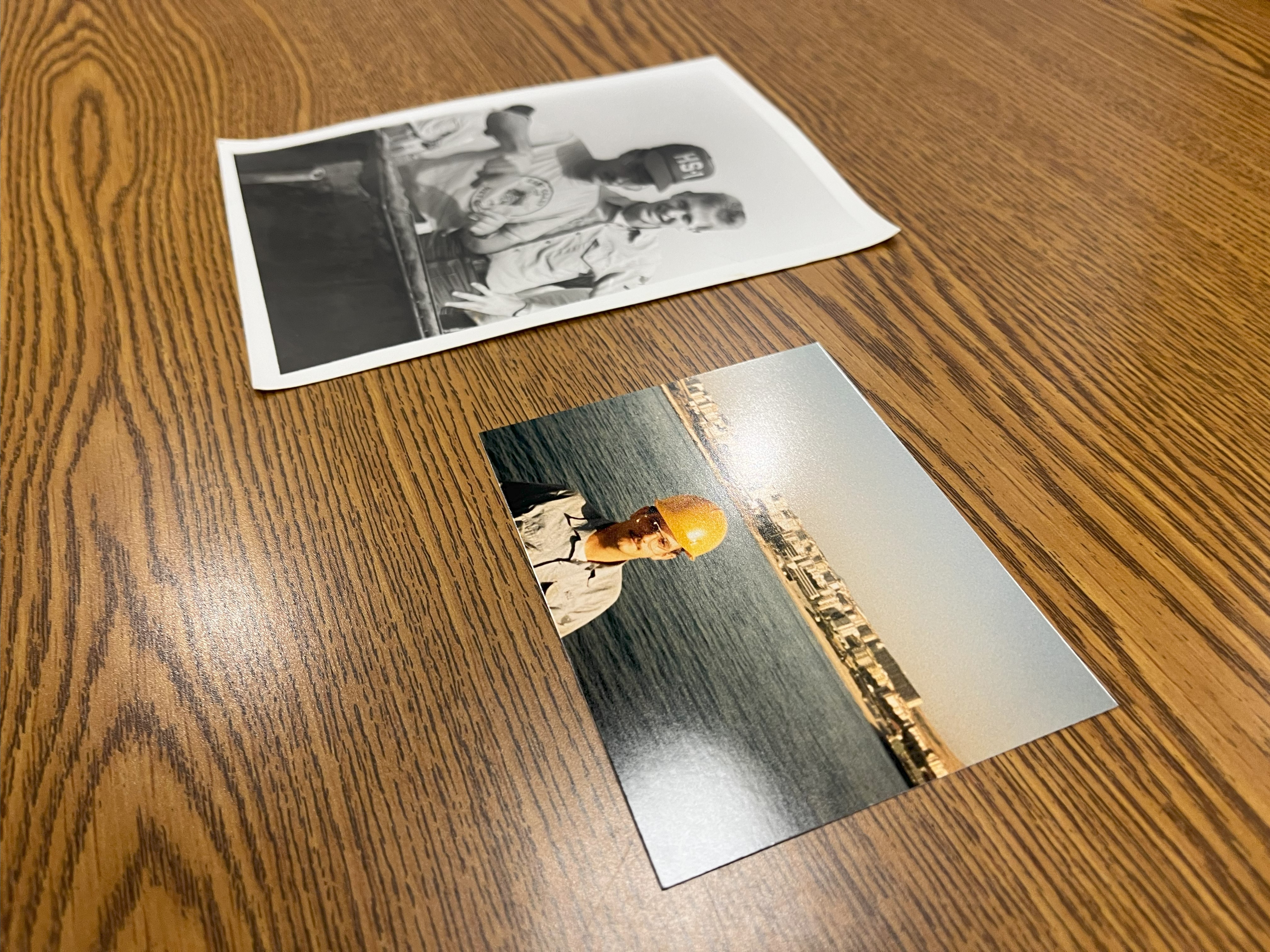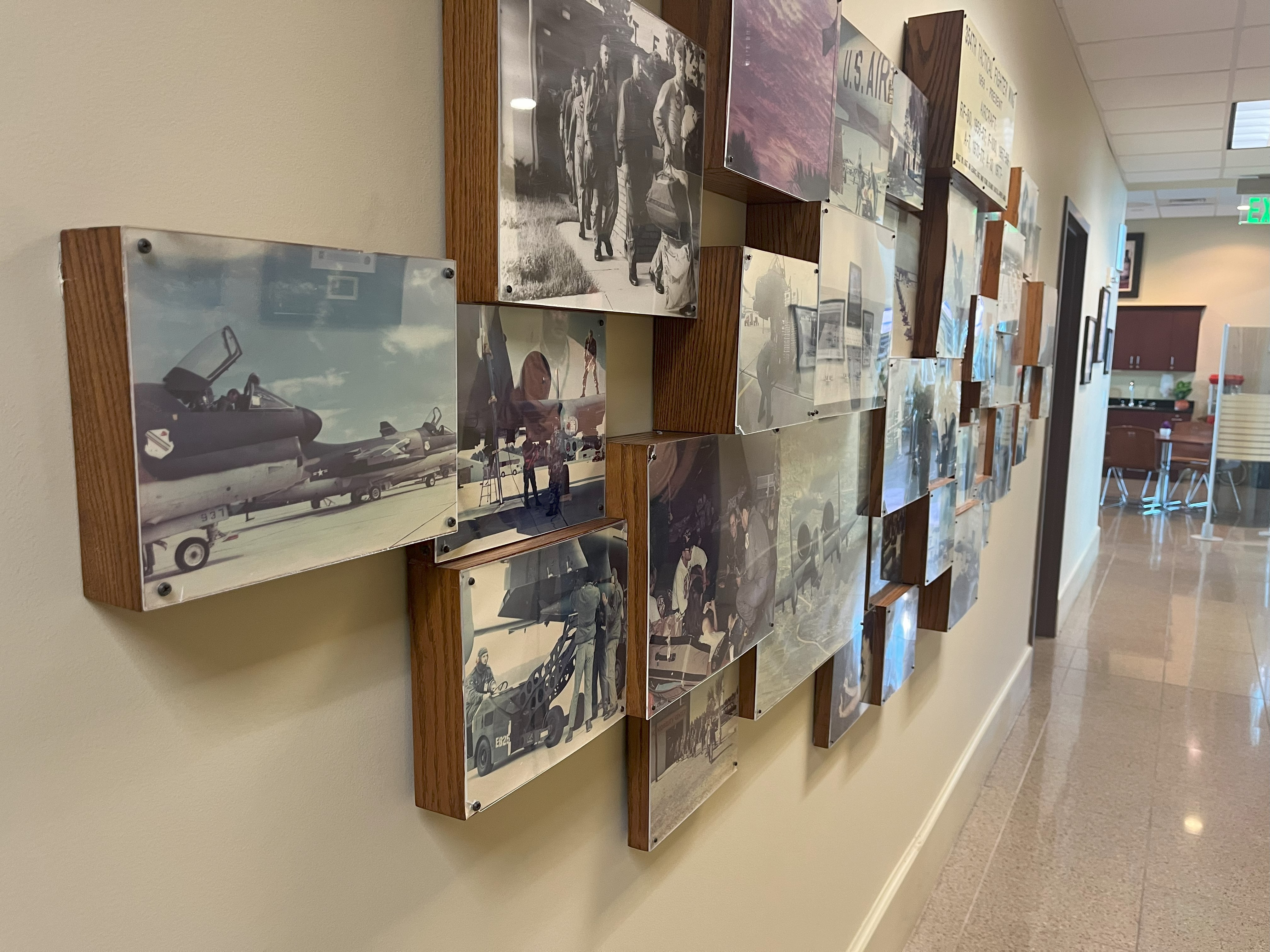“I just wanted to serve my country and make sure that people stay free, and serve the world, if we had to.” Horry County Fire Rescue Captain Boggs Middleton said.
He stands proud in front of the fire engine, housed at Horry County Fire Rescue Station 34 (Red Bluff). Flags of all the military branches blow in the breeze above the engine. “It was a good decision for me.”
Middleton served four years in the United States Army. Now going on 23 years with Horry County Fire Rescue, Middleton is just one of many military veterans who continue to serve their community by working with Horry County Government.
Across all divisions of Horry County Government, a select few continue to chase the call to serve. From signing the dotted lines of military contracts years ago to now reflecting on that time as they serve Horry County.
“I feel more like a hero in the fire department than I did in the military. I feel like I’m actually serving my community more here than I did in the military.” Horry County Firefighter Joseph Polyak said.
Polyak served as a rifleman for the United States Marine Corps for 4 years. He currently is a firefighter based out of Horry County Fire Rescue Station 34 (Red Bluff). He appreciates the opportunities Horry County Fire Rescue has to offer.
“There’s a lot of opportunity for lateral movement when smaller departments don’t have that. Also, Fire Rescue is growing because the county is growing.” Polyak said.
About 20 miles away, Horry County Police Officer James Ignaszewski stands in front of a small wooded area, talking about the four years he spent in the U.S. Army. His motivation? His wife, who believed in a lifelong dream.
“One of the biggest things was childhood dream right?” He said. “I would tell [my wife] stories about how I’ve always wanted to be in the military, and next thing I know, I’m sitting in a recruiter’s office with her, signing my life away for four years.”
After leaving the Army in 2018, he joined Myrtle Beach Police before joining Horry County Police, where he is an Environmental Services Officer. After his time in the Army, he sought an environment where he would fit in.
“I just needed something that suited me.” He said, pausing. “And it was the easiest transfer going from military to police. The structure was the same. Everything was very similar.”
Officer Ignaszewski moved from Myrtle Beach Police to Horry County Police, because of an age-old adage that he says, in his case, turned out to be true.
“You hear the stories that, you know, the ‘grass is always greener on the other side’. I kind of wanted to see for myself. I found that, personally, I fit in a lot better here than I did in Myrtle.” He said.
Family may have also influenced Dwight Thompson, a 911 Emergency Supervisor, to join the military.
“I wanted to do something different. Family members either joined the Navy or the Army, but there was a certain type of field I wanted. I wanted to go into electronics. I saw a little bit of the program in the Air Force, and that’s the route I took,” Thompson said. He served in the Air Force in the 1990s.
After his service, Thompson was in another state, when the September 11th attacks happened. His mother asked him to move back home to Horry County, apply for one job, and if he got it, he had to come back.
“I met with Renee, and she just kind of pulled me in. I’ve been here ever since.” Thompson said, sitting in an office just steps away from 911 emergency specialists taking calls. Even with the office door closed, you can still hear those communicators working hard to help the community. “It’s hard, but I do like what I do.”
While Thompson serves the community by being the calm voice at the end of the line, he says part of his role now is educating others.
“Sometimes we’re asked ‘why? Why so many questions?’ and it helps me to explain that we’re asking those questions to help you. [My role] allows me to have the knowledge to give back to not only my family, but people in the community, because a lot of them just need that education or that guidance. I like knowing that I’m able to do that for them.”
While some may have only served for a few years, others spent a lifetime in the military.
“Twenty-four years in the Air Force. Enlisted.” Tim Jackson, the General Aviation Manager for Horry County’s Aviation Services, said smiling. “I basically grew up in the Air Force. I retired in 2005. My job then was running the flight line operations, which is kind of what I do here, too.”
Jackson stuck with what he knew when coming to work for Horry County, in more ways than one.
“If you work in aviation, it gets in your blood and you can’t get away from it.” He said. “But to specifically work for the County, this environment is a lot similar to the military in the way I grew up. There's a strong sense of family, commitment, and serving the public.”
Even further, working out of the Market Common area – an area of military history in Horry County- is comforting to Jackson. “I was stationed here, actually, when I was in the Air Force. I worked in a hangar just down the road. It’s almost like coming home.”
Jackson isn’t the only one whose military service was the catalyst for their current career.
Less than 10 miles south, in the Horry County South Strand Complex, Police Captain Greg Hutchins sits with a large wooden emblem over his shoulder. On it, the Horry County Police Department badge is encircled by the words Horry County Police South Precinct. That same badge on Hutchins’ chest shines under the lights of the conference room.
“I was selected to Colonel and served in a variety of units from infantry to field artillery to human resources and logistics units. I retired a little over a year ago now.” Hutchins said. Hutchins served in the U.S. Army for 30 years. He is currently the captain of Horry County Police Precinct 2 (South).
By the end of his Army career, Hutchins was serving both Horry County and the United States through dual service, deploying and returning home to potential changes within the police department.
“Made me feel like I was the time machine police officer.” He said.
After moving south and before joining the police department, Captain Hutchins found ways to serve his new community in Horry County – by volunteering for a young Horry County Fire Rescue department.
“I was the only volunteer district fire chief that had three stations, and I paid my way to go through paramedic school, so I could be the first tactical medic for the county police department as well.”
“It’s been fun.” Even after a lifetime of service, Captain Hutchins enjoys what he does, a sentiment shared by other veterans, like Thompson from e911.
“I know it’s been a challenge, you know, with the deployments. All the divisions had people leaving, especially in the early days of the massive deployments. That was trying for the County. But you know, it’s what we had to do, and everybody was a part of it.” Hutchins said.
It’s what we had to do. A call to serve, felt by Americans across the country during the war on terror, and one of the moments that started it all – the September 11th attacks.
A call to serve, felt even by those who had served before.
“Once I got out of the military, I started working at a local sawmill. September 11th happened shortly thereafter, and I figured out I really wanted to do something to help everybody.” Middleton said. “I felt the need to help people. I felt my calling. And the only way I knew to give back…the way I wanted to give back was to join the fire department.”
A sense of duty is just one motivating factor to go back to the front lines. For others, that sense of duty drew them to help others like them – other veterans who now call Horry County home.
Located off Industrial Park Road in Conway, SC, is the Horry County Veterans Affairs office. A table dedicated to the Prisoners of War/Missing in Action (POW/MIA) is set up solemnly in the corner of the lobby. Maps, flags, and uniforms adorn the walls around where veterans and family members wait to speak with benefits counselors, like John ‘Rusty’ McKenzie and Victoria Gore.
McKenzie served in the Army National Guard of SC for more than two decades, assigned to tanks and training units. Originally from Dillon County, he officially retired from military service in January 2024. Days after retiring, he checked in with Ronnie Elvis, director of the Veterans Affairs office, and started to serve those who served.
“I knew there was something I wanted to do, but I didn’t know what it was. When I went to retire, the first thing I did was call Ronnie. I wanted to do something to give back. I’m a firm believer in things happen for a reason.” McKenzie said. He and fellow benefits counselor Victoria Gore work to ensure the veterans are properly informed.
“There’s a lot [veterans] confused by bad advice. And you know, one thing here is you’ll get it right. You might not like it, but nobody’s going to lie to you here. There’s a lot of veterans out there that slip through the cracks. They need help, they just do not know where to go to get it.” McKenzie said.
Across the hall, Gore agrees.
“There’s a lot of bad information out there.” She says, explaining an interaction with a community member who moved to the area, seeking help for obtaining hearing aids. “He’s not able to hear. He’s service-connected for his hearing. He was told the benefit worked one way in a previous state he lived in. So, I told him ‘you’re not in that state anymore.’ And I said ‘Call the clinic and get your hearing aids’.”
Victoria Gore spent almost seven years in the United States Navy as a corpsman.
“That’s what the Navy calls their medics.” She said. “Hospital Corpsman.”
She joined the Navy in 2000, and watched the September 11th terror attacks unfold from Balboa Hospital in San Diego, California.
“They had us leave immediately, pack our bags because we were going to be deployed.”
She spent her deployment on a naval ship, at sea off the coast of the Middle East, performing medevacs. After she got out of the Navy, Gore worked for Horry County Schools, before coming to Horry County Veterans Affairs.
“I think this is the best job to have… to give back and help along the way.” She said. “There’s a lot of benefits that go to the children or the spouse. And I think that’s why a lot of us fight. I didn’t fight for me. I did it for my husband and for my kids.”
National incidents can spur many to answer the call to serve. For others, personal beliefs and a need for change were motivating enough.
“I love to serve. It’s my calling. It’s what God has called me to do.” Horry County Sheriff’s Office Chaplain Eddie Hill said, sitting in one of the courtrooms at J Reuben Long Detention Center.
Smiling, Hill eagerly recounted his time in the U.S. Navy in the 1980s and 1990s. From working in the galley and on the deck of the USS Nashville to being a search and rescue swimmer, Hill knew he’d rather serve than end up on the proverbial road to nowhere, like some of his childhood and teenage friends.
“I was a punk,” Hill said. “I’m thankful for the military. I tell people all the time, outside of my salvation experience with my faith, the military was the best thing that ever happened to me.”
Hill went from traveling the world with sailors and marines to helping others in Horry County. His role with the Sheriff’s Office involves liaising with the faith-based community and supporting officers across multiple area agencies who may be going through a stressful time.
“I count it as a privilege,” Hill said. “When I get to go to a hospital room and visit an officer who had surgery, or visit with an officer and their family. Two weeks ago, I was at MUSC visiting an officer who was there with his son. Those are privileges, and I don’t take them lightly.”
Cleya Willard feels similarly, with her faith guiding how she serves in her current role.
“My job is more like a ministry for me.” She said. “I feel like if I’m not able to minister to somebody, I’m able to pick up something from the conversation that I can carry back and pray about.”
Willard worked as a human resources specialist for eight years in the Army Reserves. She found her way into the Army after meeting a local recruiter through Loris High School’s JROTC program. Now, she works as the Front Desk Supervisor at the Horry County Animal Care Center.
“I love serving the community because I feel like I’m giving back. My job is positive. I’m able to be resourceful.” Willard said. “I feel like I’m able to reach people and make a difference in their lives. I have purpose.”
At the root of it, people are the reason this small group of veterans continues to serve.
“The people and the willingness and want to help. That’s what’s kept me here.” Middleton said.
“It gives us a sense of pride to be able to be the first contact for a lot of visitors and everybody coming to Horry County,” Jackson said.
“Having the camaraderie and the brotherhood of the fire department was something I really wanted,” Polyak said. “Having your brothers and sisters with you, being able to put your boots and uniform on, showing up on time, and being able to serve the community again.”
Thank you to all the veterans of Horry County, and those actively serving in the United States Armed Forces, whether active duty, reserves, or guardsmen. Thank you to those who have served, and those who choose to continue to serve the community.
If you are a veteran in Horry County or know a veteran in Horry County, who wants to learn more about benefits available to them, contact the Horry County Veterans Affairs office at (843) 915-5480 or visit 1949 Industrial Park Rd., Conway, SC 29526.
